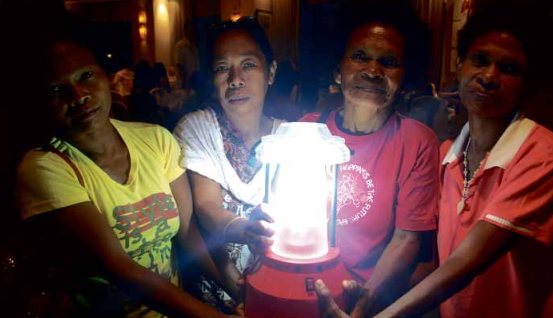
GRADUATES OF THE INDIA BAREFOOT COLLEGE After their 6-month training, the 4 Aeta women—Magda Salvador, Evelyn Clemente, Cita Diaz and Sharon Flores—now have the skills to help electrify about 100 households in their communities. ARNOLD ALMACEN
It took an Inquirer story on solar energy for Ilocos Sur province’s most powerful political leader to see the light.
After reading about “Solar Lolas,” four Aeta grandmothers needing P2.6-million funding to install and maintain solar lighting equipment in two communities where they belong, former Ilocos Sur Gov. Chavit Singson readily wrote a check covering the entire amount.
The charity project Singson decided to share his wealth with is Tanging Tanglaw, which has trained four Aeta women in India to be solar engineers and replicate solar technology in their communities. One hundred households from each community will benefit from the solar electricity project.
In a phone interview, Singson said that for the past months, he had been searching for communities to extend financial assistance to but he had difficulty verifying the nature of some of these projects.
“When I read the story (‘Solar lolas need P2.6-M funding,’ Inquirer, June 29), I thought that I could help them since I have been extending help to other similar people during my visit to other communities in the country,” Singson said.
READ: Solar Lolas’ need P2.6M funding
Last week, he wrote a check to the project proponent Diwata-Women in Resource Development Inc. (Diwata), which headed the Tanging Tanglaw initiative along with the Philippine Mine Safety and Environment Association and the Land Rover Club of the Philippines.
No politics
But Singson was quick to clarify that he is not donating to charity in pursuit of a national post in next year’s elections.
“I do not intend to run next year. I am just doing this because I like to extend help to those in need,” Singson said, noting that he also funds the studies of a number of scholars in the country.
He said he would like to visit the communities once the project starts implementation and maybe duplicate it in other parts of the country if the project becomes a success.
Marionne Ruiz, Diwata executive director, told the Inquirer that the group received the money last week and acknowledged that this would be a big help to the project.
India’s Barefoot College
She explained that those involved in the project would meet in the coming weeks to talk about purchasing materials from Barefoot College in India. The target for the project’s completion is before yearend.
Ruiz said they would buy materials to provide each household in the identified communities with a 40-watt solar panel, wall-mounted charge controller, waterproof battery box with battery, three LED very strong wall lights, one mobile phone charger, one large solar portable lantern and workshop tools, supplies and spare parts.
‘Solar lolas’ trained
Earlier, Diwata president Patricia Bunye said the program was already able to send four Aeta grandmothers—Evelyn Clemente and Sharon Flores from Gala, Zambales province, and Cita Diaz and Magda Salvador from Bamban, Tarlac province—to undergo a six-month, live-in training at Barefoot College.
The women, called the “Solar Lolas,” started their training September last year and returned to the country in March with the skills to help about 100 households in their communities still without electricity.
Bunye said the Aeta women were trained on “solar engineering, specifically, fabricating, installing, repairing and maintaining solar lighting equipment.” They also learned other livelihood activities like making mosquito nets and feminine napkins.
Upon their return to the country, Bunye said, the new goal for the solar grandmothers was to replicate the solar technology in their communities and help households from each community get electricity. Diwata revealed that in Bamban, Tarlac, most residents use kerosene lamps for lighting. In Gala, Zambales, not all families have the means to pay for electricity.
Fund-raising campaigns
“The solar grandmothers will assume the responsibility for installing and maintaining the solar panels and lamps for a minimum of five years. By replicating solar technology in their communities, they will help change the perception of what is a ‘professional’ for rural villages, and challenge both age and gender barriers,” Bunye said.
Knowing that raising funds would be a challenge, Bunye said they thought of initiating campaigns like a fundraiser dinner with a P5,000 per ticket as well as soliciting pledges from sponsors.
She said there were also plans to conduct similar activities as well as visitations to various companies to present their project background.